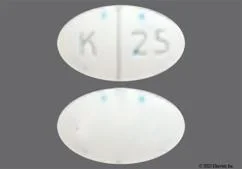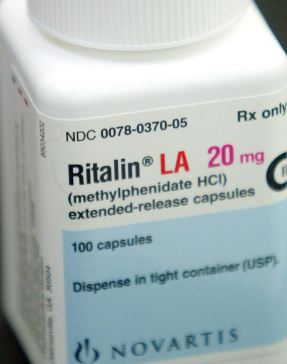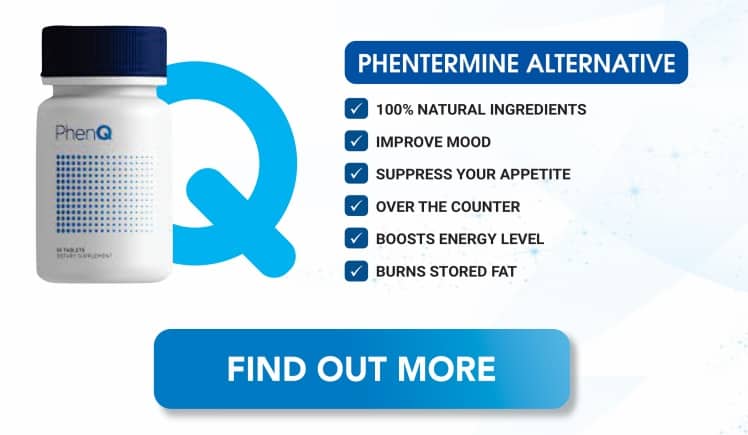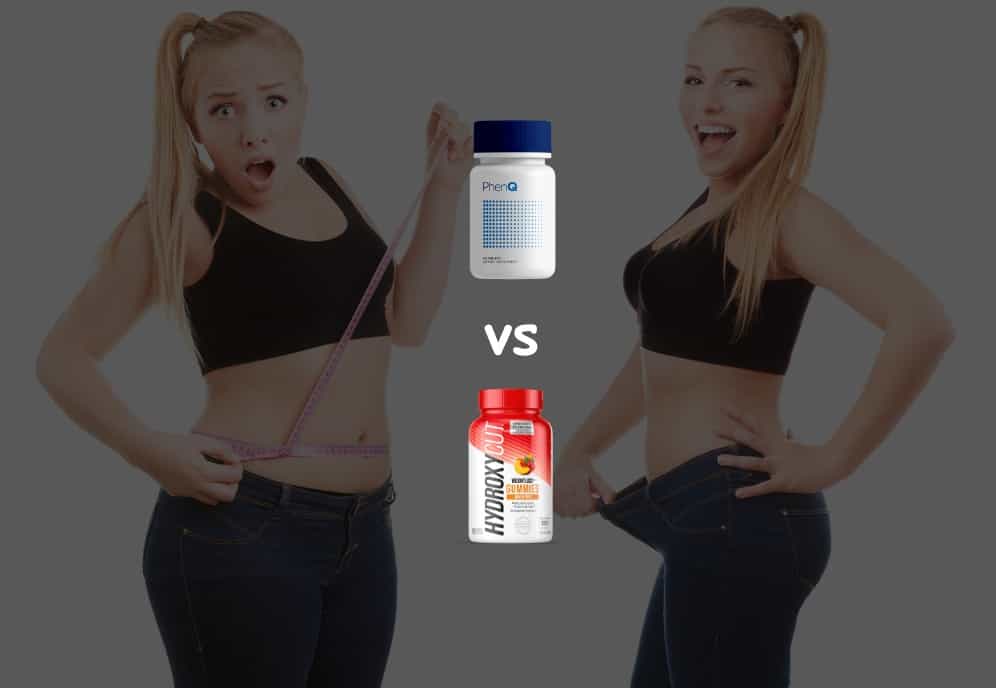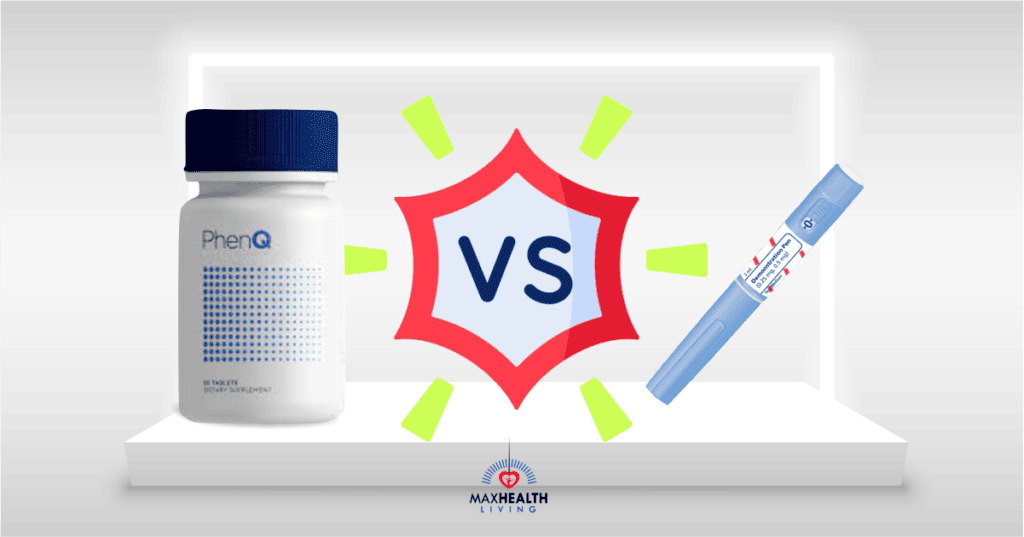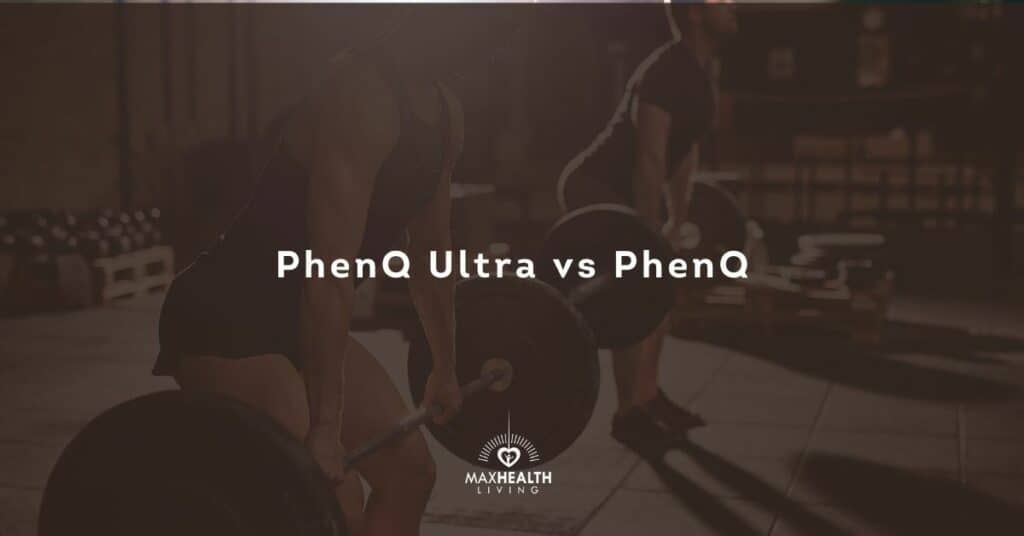Phentermine vs Ritalin: Which is Better for Weight Loss?
Max Health Living is a reader-supported site. Purchases made through links may earn a commission. Learn more.
When thinking about weight loss pills, Phentermine is a common option that comes to mind. But lately, I have noticed many people talking about Ritalin and wondering if it’s worth trying.
Now, both Phentermine and Ritalin are amphetamines, but the usage of these drugs and their intended effects differ significantly.
Phentermine is FDA-approved for weight loss purposes (short-term only). It acts by stimulating the central nervous system to suppress appetite and is taken orally.
Whereas Ritalin is a stimulant used to treat ADHD and is NOT prescribed for weight loss except when used off-label since it decreases appetite.
What Is Phentermine & How Does it Work?
Phentermine is a sympathomimetic drug that mimics the activity of adrenaline and noradrenaline to stimulate the sympathetic nervous system. It is an FDA-approved weight loss aid that doctors typically prescribe to patients with a BMI of 30 or greater.
The combination of phentermine and exercise has been shown to be effective in helping people lose weight. Because of this, it helps to suppress appetite and increase metabolism which ultimately will help you shed the extra pounds.
Nonetheless, Phentermine shows a potential for abuse and may pose severe side effects; hence, it is a prescription-controlled drug.
Phentermine Pros
Phentermine Cons
What Is Ritalin & How Does it Work?
Ritalin is a prescription pill primarily used and FDA-approved for the treatment of ADHD and narcolepsy in pediatric patients aged between 6 to 12 years.
Nonetheless, it is used OFF-LABEL for supporting weight loss progress.
It belongs to a family of drugs known as CNS stimulants and works on the central nervous system to suppress appetite and increase focus, making it easier to lose weight by keeping you from being distracted by hunger pangs or cravings for unhealthy foods.
Ritalin Pros
Ritalin Cons
Differences Between Phentermine & Ritalin
| Criteria | Ritalin | Phentermine |
|---|---|---|
| Uses: | Long-term treatment of ADHD – Prescription-only / CNS stimulant | Short-term aid to weight loss – Prescription-only / CNS stimulant |
| Drug class: | Central Nervous system stimulants | Anorexiants, CNS stimulants |
| Dosage: | Available in 10mg tablets or capsules and is usually taken twice a day at least one hour before meals. The maximum daily dose is 40mg per day. | Available in 5mg tablets or capsules and is usually taken once daily in the morning. The maximum daily dose is 60mg per day. |
| Side effects: | Rare side effects. Dizziness or lightheadedness | Dry mouth, insomnia, constipation, diarrhea, and nervousness. |
| Dosage Form: | Tablets and Capsules | Extended-release capsules allow for fewer doses |
| Drug interactions: | Alcohol, other stimulants | Metformin, sibutramine, MAOIs, SSRIs, and benzodiazepines |
| Disease Interactions: | Cardiac disease, Glaucoma, Hypertension, Liver diseases. | Should be avoided by patients with heart disease or high blood pressure |
| Prescription requirement: | Prescription-only | Prescription-only under close medical supervision |
| Potential for Abuse: | Less likely to cause withdrawal symptoms | More likely to cause symptoms of withdrawal |
| Pregnancy safety: | Category C. Avoid if possible | Category X; not safe for pregnancy |
Phentermine vs. Ritalin – Product Comparison
Phentermine is a generic drug manufactured by multiple companies and sold under different trade names.
Two of its most popular brand names are Adipex-P and Lomaira. Among these, Lomaira is distributed by KVK tech which is a leading manufacturer for the American public.
In parallel, Adipex-P is produced by Sunrise Pharma, another well-known pharmaceutical company based in the United States. In comparison, Ritalin is the brand name of the active compound methylphenidate HCl manufactured by Novartis.
Key Ingredients
Phentermine and Ritalin are based on a single active compound and are administered as a monotherapy.
Both of them work by stimulating the central nervous system, due to which you may feel a reduction in appetite, an increase in energy levels, and improved focus.
Common Ingredients
- None
Ritalin Key Ingredients
- Methylphenidate HCl
Phentermine Key Ingredients
- Phentermine HCl
Dosage Regimen
The dosage regime of both phentermine and Ritalin varies depending on the person’s condition and their dose-response. The following information includes only the average doses of this medicine. If your dose is different, do not change it unless your doctor tells you to.
Phentermine Dosage
The amount of phentermine that you take depends on the potency you’re prescribed.
Also, the number of doses you take each day, the time allowed between doses, and the length of time you take medicine depend on the medical problem for which you are using the medicine.
Nonetheless, phentermine offers four different dosage options.
- A 4 mg dose (which equals half a tablet) taken three times a day might provide ample relief from untimely cravings.
- 15 or 30 mg capsules after a two-hour gap post-breakfast might be more appropriate.
- An 18.75 mg dose (equaling half a tablet) once a day or taken orally twice daily.
- 37.5 mg capsules or tablets (Adipex-P) 1 to 2 hours after breakfast to achieve the desired impact.
Ritalin Dosage
Like phentermine, Ritalin also has numerous dosage regimes that the doctor adjusts according to the patient’s severity of ADHD.
- The recommended Ritalin dosage for children with ADHD is 10 mg once daily after breakfast or lunch.
- For those who weigh less than 77 pounds (35 kilograms), the dosage can be decreased to 2.5 milligrams (mg) daily.
- For those who weigh between 77 and 113 pounds (35-51 kg), the dosage may be increased to 20 milligrams.
Also read: Adderall vs Phentermine: Which works better?
Ritalin Vs. Phentermine – Which Is Best For Weight Loss?
Ritalin for Weight loss
- Reduction Of Excess Fat
Ritalin has shown potential to induce fat loss. Correspondingly, a study performed on children taking methylphenidate showed that it leads to a significant reduction in fat mass, especially in abdominal fat.
- Disrupts Appetite
Ritalin stimulates the production of dopamine and norepinephrine in your brain. These chemicals make you feel more alert, focused, and energetic and cause you to feel hungry less often. This reduction in your calorie intake while taking Ritalin may lead to weight loss.
This is evident from a study performed on obese men in which participants demonstrated a 23% decrease in energy intake with the moderate dose of methylphenidate (aka Ritalin) compared to the placebo.
Moreover, consuming the lowest effective dose of methylphenidate made the individuals consume 34% fewer kilocalories than the placebo.
In a nutshell, methylphenidate substantially reduced energy intake from highly palatable food by one-third in obese adult males. This effect may be attributed to the increased dopamine levels in the brain, as it plays an essential role in regulating hunger. On a side note, low dopamine levels in the brain may make you more hungry.
Phentermine for Weight Loss
- Eliminates Excess Fat
Phentermine works by increasing the levels of two chemicals called serotonin and norepinephrine in your brain.
Serotonin produces feelings of well-being and happiness, while norepinephrine boosts energy levels by helping you burn fat stores for fuel instead of carbohydrates from food.
- Controls Binge eating
Phentermine triggers the release of norepinephrine in the central nervous system. The norepinephrine reduces hunger by activating the β-adrenergic receptors, which activate brain regions that control appetite.
Correspondingly, a 12-week clinical trial reported that the phentermine group lost 12.1% of their initial body weight, whereas the placebo group lost only 8.8%.
This weight reduction in both groups was attributed to reduced cravings for all food types, with the phentermine group showing a more significant decline in cravings for fats and sweets compared to the placebo.
Phentermine and Ritalin Side Effects – Which is Safer?
Phentermine Side Effects
Phentermine’s side effects may range from mild to severe to life-threatening.
- Mild Side Effects
For instance, it may cause self-limiting gastrointestinal problems like nausea, abdominal pain, or changes in bowel movements.
- Moderate Side Effects
The concerning side effects may include,
>> A fast/irregular/pounding heartbeat,
>> Mental/mood changes (such as irritability, uncontrolled anger, hallucinations, and anxiety) and changes in libido.
- Severe Side Effects
Side effects that indicate an emergency include,
>> Severe allergic reaction to phentermine, trouble speaking, seizure, weakness on one side of the body, and vision changes (such as blurred vision).
Evidence from User Experience
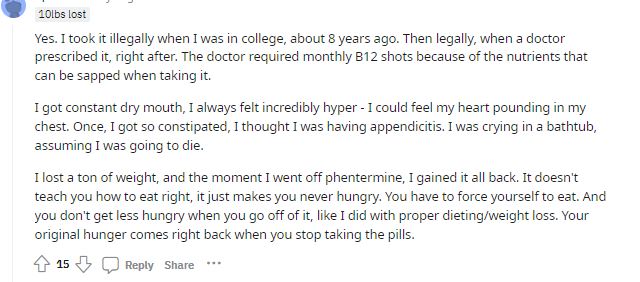
Ritalin Side Effects
Ritalin’s side effects also vary in their range of severity.
- Common Side Effects
The common side effects include,
>> Headache,
>>Emotional changes (aggression, irritability, depression, anxiety, tension),
>> Insomnia, loss of appetite leading to weight changes,
>> Stomach ache, dry mouth, and nausea or vomiting.
- Serious Side Effects
Serious side effects encompass:
>> Mood or personality changes,
>> Suicidal thoughts or thoughts of harming others,
>> Irregular or rapid heartbeats (palpitations), high blood pressure,
>> Sudden onset of facial tics (involuntary muscle movements in the face),
>> Allergic reactions (anaphylaxis) to methylphenidate.
- Life-threatening side effects
Get immediate medical help if you feel you’re about to faint, have a seizure, have symptoms of a heart attack (such as chest/jaw/left arm pain, shortness of breath, unusual sweating), or have signs of a stroke (such as weakness on one side of the body, trouble speaking, sudden vision changes, confusion).
Evidence from User Experience
A Ritalin user documented her experience of taking Ritalin for ADHD and how it suppressed her appetite, but at what cost? Headaches, increased heart rate, cotton mouth, dizziness, loss of appetite, and a disturbed sleep pattern.

Can You Take Phentermine And Ritalin Together?
Phentermine and Ritalin together can be a dangerous combination. While these two drugs have similar effects on the body, they are very different in their chemical makeup, and combining them can cause serious side effects.
Phentermine is an appetite suppressant that works by increasing levels of norepinephrine in the brain.
Ritalin is a stimulant that works by increasing dopamine levels in the brain, which causes a feeling of euphoria and excitement.
Combining these two drugs can cause hyperactivity, insomnia, anxiety, restlessness, irritability, rapid heartbeat, tremors, and seizures. Additionally, there have been reports of people experiencing seizures while taking this drug combination.
How Long After Taking Phentermine Can I Take Ritalin?
You should never take phentermine and Ritalin together because both of them are CNS stimulants, and this may amplify their risk of causing side effects.
So, what is the best way to adjust their dosage regimes?
Well, Phentermine stays in your system for approximately FOUR DAYS; therefore, to be on the safe side, you should take Ritalin for at least five to six days. This ensures that phentermine has been flushed out of your system and rules out potential drug interactions.
Phentermine And Ritalin Interactions
If you are considering taking Phentermine or Ritalin, you should be aware of the potential interactions between it and other drugs.
For example, a medication for diabetes may interact with another medication, such as phentermine or Ritalin, to lower blood sugar levels too much. It can be dangerous if it causes dizziness, weakness, and fainting. It can also lead to severe hypoglycemia (low blood sugar).
Phentermine Drug Interactions
The following are some of the most commonly prescribed medications that interact with phentermine:
- Antidepressants: Tricyclic antidepressants such as amitriptyline (Elavil), imipramine (Tofranil), desipramine (Norpramin), nortriptyline (Aventyl), protriptyline (Pamelor) and selective serotonin reuptake inhibitors (SSRIs) such as fluoxetine (Prozac), paroxetine (Paxil) and sertraline (Zoloft). May increase the risk of development of certain conditions like serotonin syndrome.
- Antihistamines: Promethazine and diphenhydramine. Phentermine may decrease the sedative activities of these drugs.
- Antibiotics: Tetracyclines, erythromycin, chloramphenicol, quinolones, and sulfonamides. These antibiotics may decrease the metabolism of phentermine.
- Alcohol: Alcohol interferes with the metabolism of phentermine.
- Central nervous system depressants: barbiturates, benzodiazepines. This combination amplifies the risk of the onset of depression.
Ritalin Drug interactions
The following are some of the most commonly prescribed medications that interact with Ritalin:
- Antidepressants: Tricyclic antidepressants such as amitriptyline (Elavil), imipramine (Tofranil), desipramine (Norpramin), nortriptyline (Aventyl), protriptyline (Pamelor) and doxepin (Sinequan). These can increase the risk of side effects. If you are taking one of these medications, consult your physician before taking Ritalin.
- Narcotic analgesics: Examples include codeine, hydrocodone, meperidine, morphine and oxycodone. These drugs can cause drowsiness, confusion, and dizziness when taken together with Ritalin. If you take narcotic pain relievers for any reason, be sure to consult your physician before taking Ritalin.
- Antihistamines: An example is diphenhydramine (Benadryl). This drug may cause drowsiness when taken together with Ritalin.
- Barbiturates: Barbiturates such as phenobarbital or secobarbital. Ritalin may increase the sedative effects of these drugs, which can cause drowsiness and dizziness.
- Inhibitors of Cytochrome P450 2D6: selective serotonin reuptake inhibitors (SSRIs) such as fluoxetine (Prozac) and paroxetine (Paxil). Serotonin-norepinephrine reuptake inhibitors (SNRIs) such as venlafaxine (Effexor) may also inhibit the metabolism of Ritalin.
Ritalin vs. Phentermine Alternatives & Substitutes
Choosing a weight loss solution can be confusing and overwhelming. Ritalin and Phentermine are two common options for weight loss, but both have the potential for misuse and dependence, and any weight you lose may come back when you stop taking them.
In this case, PhenQ is a suitable over-the-counter alternative to both these prescription diet pills. It is an all-natural supplement that helps with weight loss without the side effects of Ritalin or Phentermine.
It helps burn fat faster while suppressing your appetite. It also helps boost your metabolism to burn more calories throughout the day.
FAQs
How many calories does Ritalin burn?
According to real user experience, Ritalin may help you lose 3 to 4 pounds per week.
How long does it take to lose weight on Ritalin?
You may start seeing a reduction in your pounds within the first week. Nonetheless, it may take at least a month to bring a noticeable difference in your physique.
Related posts:
Important Disclaimer: The information contained on MAX HEALTH LIVING is intended for informational and educational purposes only. Any statements made on this website have not been evaluated by the FDA and any information or products discussed are not intended to diagnose, cure, treat, or prevent any disease or illness. Please consult a healthcare practitioner before making changes to your diet or taking supplements that may interfere with medications.
Who We Are

We are a team of fitness, health, and supplement experts, and content creators. Over the past 4 years, we have spent over 123,000 hours researching food supplements, meal shakes, weight loss, and healthy living. Our aim is to educate people about their effects, benefits, and how to achieve a maximum healthy lifestyle. Read more.

